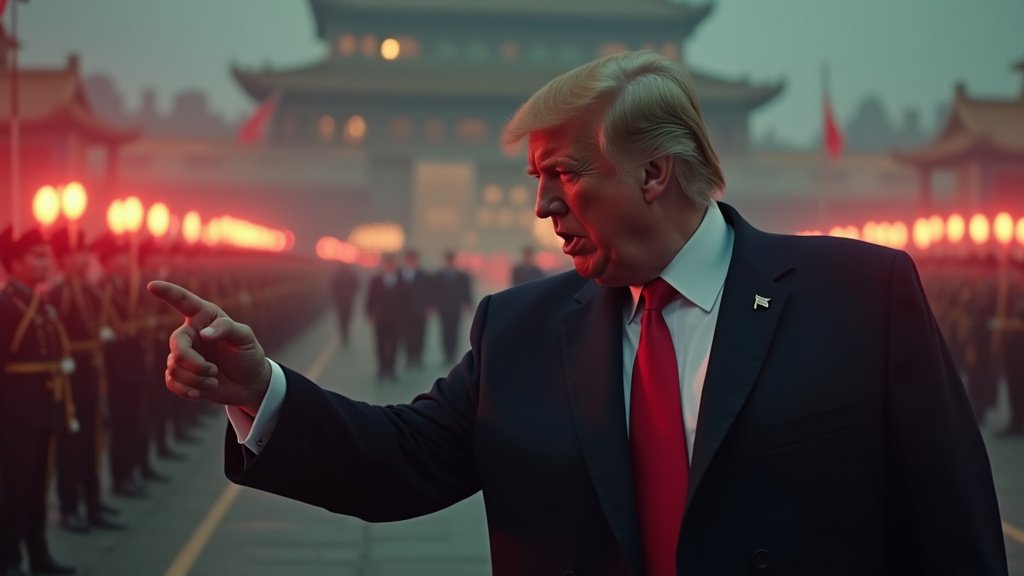In a day of significant global developments, multiple high-profile news stories have emerged across geopolitical, technological, and economic spheres. Former President Donald Trump has leveled accusations of conspiracy against Chinese President Xi Jinping, alleging collusion with Russia’s Vladimir Putin and North Korea’s Kim Jong-un amidst a major military parade in Beijing. Concurrently, tech giant Google has secured a reprieve in a major antitrust case, with a federal judge ruling against the forced sale of its Chrome browser, though imposing other significant restrictions. Meanwhile, Federal Reserve Governor Lisa Cook has initiated legal action against President Trump to prevent her removal, underscoring ongoing battles over the independence of key U.S. institutions. These significant developments are currently trending across major news outlets.
Geopolitical Accusations Surface Amid Beijing Parade
Former President Donald Trump directed sharp accusations at Chinese President Xi Jinping, alleging that Xi was “conspiring” against the United States with Russian President Vladimir Putin and North Korean leader Kim Jong-un. Trump’s remarks, posted on his Truth Social platform, coincided with a massive military parade in Beijing celebrating the 80th anniversary of the end of World War II. President Xi was visibly flanked by Presidents Putin and Kim at the event, which showcased China’s military might. Trump also voiced frustration with China’s historical narrative surrounding the war, suggesting it downplayed the crucial role of the United States in defeating Japanese forces. In response, Kremlin aide Yury Ushakov dismissed the conspiracy claims as “ironic,” stating that no plotting against the U.S. was occurring and that leaders understood the role of the U.S. and President Trump in global narratives. The gathering of the three leaders in Beijing was widely interpreted as a display of solidarity and a potential challenge to Western-led global order.
Google Avoids Chrome Divestiture in Landmark Antitrust Ruling
In a significant victory for Alphabet Inc., a federal judge has ruled that Google will not be forced to sell its ubiquitous Chrome web browser as part of the Justice Department’s sweeping antitrust case. U.S. District Judge Amit Mehta stated that the government “overreached” in seeking the divestiture of Chrome, deeming it “incredibly messy and highly risky.” The ruling comes after the court previously found Google had illegally maintained a monopoly in the online search market, largely through billions of dollars in exclusive distribution agreements with companies like Apple to make Google Search the default on their devices. While Google retains Chrome and its Android operating system, the judge has imposed substantial restrictions. The tech giant is now barred from entering or maintaining exclusive contracts for the distribution of key products, including Chrome and Google Assistant. Furthermore, Google must share certain search data with competitors. The company, however, has indicated plans to appeal the broader ruling, while its stock saw a notable increase following the decision, signaling investor relief.
Fed Governor Lisa Cook Sues Trump Over Removal Attempt
Federal Reserve Governor Lisa Cook has filed a lawsuit challenging President Trump’s efforts to remove her from her position, a move critics argue undermines the central bank’s vital independence. Trump announced his intention to fire Cook, citing allegations of mortgage fraud surfaced by Bill Pulte, director of the Federal Housing Finance Agency. Cook, the first Black woman to serve as a Fed governor, asserts in her legal filing that Trump’s action is “unprecedented and illegal” and lacks factual or legal basis. Her legal team contends the mortgage allegations, related to applications filed before her Fed nomination, are a pretext to vacate her seat for a Trump appointee. The lawsuit argues that removing a Fed governor “for cause” requires more than unsubstantiated allegations and that the president’s actions violate the Federal Reserve Act, which is designed to insulate the bank from political pressure. The case raises complex questions about presidential authority over independent agencies and could potentially reach the Supreme Court.
FedEx Boosts Presence in Saudi Arabia Amid Economic Growth
FedEx has completed a significant expansion of its operations in Saudi Arabia, transitioning to a direct-serve model that includes launching its first dedicated cargo flight into the Kingdom from the United States and Europe. The logistics giant is also establishing a regional hub at the upcoming King Salman International Airport in Riyadh, which will serve as a key connection point for international markets to Saudi Arabia, Bahrain, Kuwait, and Qatar. This expansion of FedEx Logistics freight forwarding services aligns with Saudi Arabia’s Vision 2030, aimed at economic diversification and enhancing its role as a global logistics hub. The move underscores the Kingdom’s growing appeal for international investment and trade, supported by recent reports of a substantial trade surplus. Saudi officials and FedEx executives marked the milestone, emphasizing improved connectivity and service offerings.
Apple’s AI Ambitions Tested by Talent Exodus
Apple’s artificial intelligence division is facing a critical challenge as a wave of key researchers depart for rival tech firms. Most recently, Jian Zhang, Apple’s lead researcher for robotics and AI, has joined Meta’s Robotics Studio. This follows the exit of several prominent members from Apple’s Foundation Models team, crucial for its “Apple Intelligence” platform. These researchers are reportedly moving to companies like OpenAI and Anthropic, lured by aggressive recruitment strategies and substantial compensation packages offered by competitors. Industry insiders view these departures as a “crisis of confidence” in Apple’s AI strategy and future, particularly as the company reportedly debates increasing its reliance on external AI models rather than solely in-house development. The exodus risks delaying advancements in areas like AI-driven hardware and virtual assistants, and is impacting internal morale as Apple strives to keep pace in the rapidly evolving AI race.
These converging news events highlight a dynamic period of significant shifts in global politics, technology regulation, economic policy, and corporate strategy, with implications that will likely unfold in the coming weeks and months.





